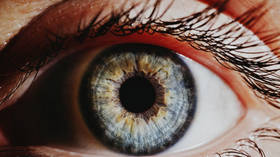Humans have the genes to REGROW their own eyes – they just got switched off through evolution

Researchers have found that, much like species of fish and lizard, humans also have the ability to regenerate damaged sensory organs like the eye, but somewhere on our evolutionary journey, the gene was ‘switched off.’
Trauma to the eye and, more specifically retina damage, is the leading cause of blindness in humans worldwide, as the sensory organ is remarkably complex, with a vast array of light-detecting rod and cone cells feeding light data to our central neural system.
That’s why retina tissue is impossible for us to regenerate in the same way as we would other damaged tissue, such as skin or bone.
However, species like the zebrafish are able to regenerate this type of tissue, and humans share 70 percent of the same genes with them, including the very one that affords them the ability to regenerate their visual sensory tissue.
Also on rt.com ‘Clone’ of previous pandemic which threatened world’s children making ominous resurgence, warn scientistsAccording to Johns Hopkins University neuroscientist Seth Blackshaw, this ability is actually the default setting for many animals, including humans – we just lost it at several points on our evolutionary tree. Didn’t see that one coming.
“Our research overall indicates that the potential for regeneration is there in mammals, including humans, but some evolutionary pressure has turned it off,” explained Blackshaw.
While we humans are still in the womb, the retina forms as an extension of the outwardly growing brain and central neural system that reaches to the back of our eyes.
Within the retina, Müller glial cells act as the housekeepers and guardians of our eyes, cleaning up neurotransmitters and various debris within the eye, while also triggering the immune response as and when needed.
In certain animals, such as fish and reptiles, these Müller cells also regenerate the neurons that convey received light signals from the eyes to the brain for processing.
Neuroscientist Thanh Hoang and his team from Johns Hopkins examined the genes found in the cells in zebrafish, chicks, and mice and watched how they responded to retinal injury across the three species.
As expected, the genes fired up the immune response to help clean up damaged tissue and fight off impending infection. However, in the mammalian cells in the mice, a network then suppresses the genes before they can begin transforming into the regeneration cells as they do in the other, non-mammalian species.
By fiddling with the underlying mechanism which governs the cells, the researchers were able to coax cells to start regenerating retinal neurons in adult mice after they had sustained retinal injury.
Also on rt.com Sixth sense? Scientists claim to have discovered FIRST animal organs that can ‘see’ magnetic fieldsThe researchers suspect that the loss of this regeneration ability may be some evolutionary trade off, in which mammals got better at fighting off parasites at the cost of more advanced tissue regeneration abilities.
“We know that certain viruses, bacteria, and even parasites can infect the brain. It could be disastrous if infected brain cells were allowed to grow and spread the infection through the nervous system,” Blackshaw said.
We are still far from the stage where humans will be able to regenerate damaged complex sensory organs like the eye, but the research opens a whole new avenue of possibilities for future research and may provide some light at the end of the tunnel for ongoing, trauma-induced blindness around the world.
Think your friends would be interested? Share this story!














